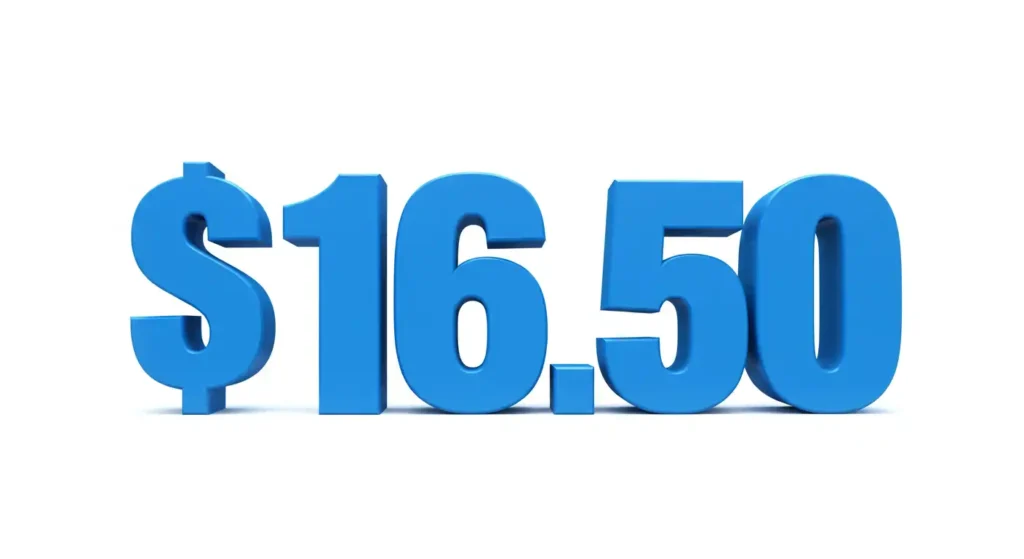New York State’s Minimum Wage for 2025

The minimum wage for New York City is $16.50 as of January, 1st, 2025. The remainder of New York State is $15.50. New York State continues to lead the way in ensuring fair compensation for its workforce. As of January 1, 2025, significant updates to the minimum wage structure will come into effect. These changes impact workers across various industries and regions, reflecting the state’s commitment to balancing economic growth with equitable pay. Here’s everything you need to know.
New York 2025 Minimum Wage Table
| Location | Minimum Wage as of 01/01/2025 | Tipped Service Employees | Tipped Food Service Workers |
|---|---|---|---|
| New York City | $16.50 | $13.75 Cash Wage $2.75 Tip Credit |
$11.00 Cash Wage $5.50 Tip Credit |
| Long Island & Westchester | $16.50 | $13.75 Cash Wage $2.75 Tip Credit |
$11.00 Cash Wage $5.50 Tip Credit |
| Remainder of New York State | $15.50 | $12.90 Cash Wage $2.60 Tip Credit |
$10.35 Cash Wage $5.15 Tip Credit |
*Only hospitality employers are allowed to take credit from minimum wage.
**For additional information about the minimum wage for home care aides, please see the Home Care Aide Minimum Wage fact sheet (P105).
The state minimum wage is scheduled to increase by $0.50 per year on January 1, 2025, and January 1, 2026. Beginning in 2027, the minimum wage will annually increase by the three-year moving average of the Consumer Price Index for Urban Wage Earners and Clerical Workers (CPI-W) for the Northeast Region. An "off-ramp" is available in the event of certain economic or budget conditions. For more details, visit Governor Hochul's announcement.
Data Retrieved From: https://dol.ny.gov
‘Pro-Tip’
Know Your Region: Familiarize yourself with the minimum wage rates specific to your region (New York City, Long Island & Westchester, or the rest of the state) to ensure you’re receiving fair pay.

New York Recent Minimum Wage Changes
| Region/Employer Type | Effective Date | Minimum Hourly Rate |
|---|---|---|
| New York City: Large employers (11 or more employees) | December 31, 2016 | $11.00 |
| December 31, 2017 | $13.00 | |
| December 31, 2018 | $15.00 | |
| New York City: Small employers (10 or fewer employees) | December 31, 2016 | $10.50 |
| December 31, 2017 | $12.00 | |
| December 31, 2018 | $13.50 | |
| December 31, 2019 | $15.00 | |
| New York City: All employers | January 1, 2024 | $16.00 |
| January 1, 2025 | $16.50 | |
| Long Island and Westchester Counties | December 31, 2016 | $10.00 |
| December 31, 2017 | $11.00 | |
| December 31, 2018 | $12.00 | |
| December 31, 2019 | $13.00 | |
| December 31, 2020 | $14.00 | |
| December 31, 2021 | $15.00 | |
| January 1, 2024 | $16.00 | |
| January 1, 2025 | $16.50 | |
| Remainder of New York State | December 31, 2016 | $9.70 |
| December 31, 2017 | $10.40 | |
| December 31, 2018 | $11.10 | |
| December 31, 2019 | $11.80 | |
| December 31, 2020 | $12.50 | |
| December 31, 2021 | $13.20 | |
| December 31, 2022 | $14.20 | |
| January 1, 2024 | $15.00 | |
| January 1, 2025 | $15.50 |
Data Retrieved From: https://dol.ny.gov/
‘Pro-Tip’
Tipped Worker Insights: If you’re a tipped worker, understand the distinction between cash wage and tip credit amounts. Only hospitality employers are allowed to use tip credits.
New Minimum Wage Rates by Region
New York’s minimum wage rates vary by region, acknowledging the diverse economic conditions across the state. Below is a breakdown of the updated rates effective January 1, 2025:
General Minimum Wage
New York City: $16.50/hour
Long Island & Westchester Counties: $16.50/hour
Remainder of New York State: $15.50/hour
Tipped Employees
Only hospitality employers are allowed to take tip credits.
Tipped Service Employees:
New York City & Long Island/Westchester:
Cash Wage: $13.75/hour
Tip Credit: $2.75/hour
Remainder of New York State:
Cash Wage: $12.90/hour
Tip Credit: $2.60/hour
Tipped Food Service Workers:
New York City & Long Island/Westchester:
Cash Wage: $11.00/hour
Tip Credit: $5.50/hour
Remainder of New York State:
Cash Wage: $10.35/hour
Tip Credit: $5.15/hour
‘Pro-Tip’
Fast Food Workers: Ensure you’re being paid the minimum hourly rate applicable to your region. Fast food workers in New York City will earn $16.50/hour starting January 2025.
New York Historical Minimum Wage Table
| Effective Date | Minimum Wage Rate |
|---|---|
| Prior to 1960 | State minimum wage rates varied from industry to industry |
| October 1, 1960 | Newly established general minimum wage set at $1.00 |
| October 15, 1962 | Increased from $1.00 to $1.15 |
| October 15, 1964 | Increased from $1.15 to $1.25 |
| January 1, 1967 | Increased from $1.25 to $1.50 |
| February 1, 1968 | Increased from $1.50 to $1.60 |
| July 1, 1970 | Increased from $1.60 to $1.85 |
| May 1, 1974 | Increased from $1.85 to $2.00 |
| January 1, 1975 | Increased from $2.00 to $2.10 |
| January 1, 1976 | Increased from $2.10 to $2.30 |
| October 6, 1978 | Increased from $2.30 to $2.65 |
| January 1, 1979 | Increased from $2.65 to $2.90 |
| January 1, 1980 | Increased from $2.90 to $3.10 |
| January 1, 1981 | Increased from $3.10 to $3.35 |
| April 1, 1990 | Increased from $3.35 to $3.80 |
| April 1, 1991 | Increased from $3.80 to $4.25 |
| March 31, 2000 | Increased from $4.25 to $5.15 |
| January 1, 2005 | Increased from $5.15 to $6.00 |
| January 1, 2006 | Increased from $6.00 to $6.75 |
| January 1, 2007 | Increased from $6.75 to $7.15 |
| July 24, 2009 | Increased from $7.15 to $7.25 |
| December 31, 2013 | Increased from $7.25 to $8.00 |
| December 31, 2014 | Increased from $8.00 to $8.75 |
| December 31, 2015 | Increased from $8.75 to $9.00 |
Data Retrieved From: https://dol.ny.gov/
‘Pro-Tip’
Home Care Aides: Review the Home Care Aide Minimum Wage fact sheet to understand specific wage rates applicable to your job.

Annual Increment Schedule and Future Adjustments
The state minimum wage will increase annually by $0.50 through January 1, 2026. Beginning in 2027, the minimum wage will be tied to the three-year moving average of the Consumer Price Index for Urban Wage Earners and Clerical Workers (CPI-W) for the Northeast Region. This adaptive approach ensures wages keep pace with inflation and economic conditions. An “off-ramp” mechanism exists for economic downturns, providing flexibility if adverse conditions arise.
‘Pro-Tip’
Understand Off-Ramps: Be aware of the “off-ramp” provision, which allows wage increases to pause under certain economic or budgetary conditions.
Fast Food Employees’ Minimum Wage
Fast food workers also benefit from these updates. Their minimum wage is set at $16.50/hour in New York City and $15.50/hour for the rest of the state. These rates highlight the state’s emphasis on supporting sectors that traditionally experience wage disparities.
| Region | Effective Date | Minimum Hourly Rate |
|---|---|---|
| New York City | December 31, 2016 | $12.00 |
| December 31, 2017 | $13.50 | |
| December 31, 2018 | $15.00 | |
| January 1, 2025 | $16.50 | |
| Outside of New York City | December 31, 2016 | $10.75 |
| December 31, 2017 | $11.75 | |
| December 31, 2018 | $12.75 | |
| December 31, 2019 | $13.75 | |
| December 31, 2020 | $14.50 | |
| July 1, 2021 | $15.00 | |
| January 1, 2025 | $15.50 |
Data Retrieved From: https://dol.ny.gov/
‘Pro-Tip’
Document Pay Records: Keep personal records of your hours worked and wages paid to address any potential disputes with your employer.
Historical Context
New York’s minimum wage has undergone numerous changes since its inception in 1960, starting at $1.00/hour. Over the decades, the state has implemented consistent increases to ensure fair compensation. Notably:
In 2016, the wage system was restructured to vary by region and employer size.
By 2018, New York City’s minimum wage for large employers reached $15.00/hour, setting a benchmark for other regions.
The latest increase, effective January 1, 2025, builds on this legacy, maintaining the state’s position as a leader in wage equity.
‘Pro-Tip’
Verify Employment Classification: Ensure your employer correctly classifies your role as tipped or non-tipped to avoid discrepancies in pay.
Wage Theft and Compliance
Under New York Penal Law Section 155, wage theft is considered larceny. Employers who fail to pay wages may face criminal prosecution. This legal framework underscores the state’s commitment to protecting workers’ rights. Employers are encouraged to attend free educational seminars provided by the state to ensure compliance with wage laws.
‘Pro-Tip’
Budget for Increases: If you’re an employer, prepare for annual increases to the minimum wage and adjust your payroll budgets accordingly.
Looking Ahead
New York’s proactive approach to adjusting minimum wages reflects a broader commitment to addressing economic inequality. As businesses adapt to these changes, workers can look forward to fairer pay that aligns with the cost of living. For additional resources or to determine the wage you should be earning, visit the New York State Department of Labor’s Minimum Wage Lookup Tool.
Disclaimer: The content provided on this webpage is for informational purposes only and is not intended to be a substitute for professional advice. While we strive to ensure the accuracy and timeliness of the information presented here, the details may change over time or vary in different jurisdictions. Therefore, we do not guarantee the completeness, reliability, or absolute accuracy of this information. The information on this page should not be used as a basis for making legal, financial, or any other key decisions. We strongly advise consulting with a qualified professional or expert in the relevant field for specific advice, guidance, or services. By using this webpage, you acknowledge that the information is offered “as is” and that we are not liable for any errors, omissions, or inaccuracies in the content, nor for any actions taken based on the information provided. We shall not be held liable for any direct, indirect, incidental, consequential, or punitive damages arising out of your access to, use of, or reliance on any content on this page.
About The Author

Roger Wood
With a Baccalaureate of Science and advanced studies in business, Roger has successfully managed businesses across five continents. His extensive global experience and strategic insights contribute significantly to the success of TimeTrex. His expertise and dedication ensure we deliver top-notch solutions to our clients around the world.
Time To Clock-In
Start your 30-day free trial!
Experience the Ultimate Workforce Solution and Revolutionize Your Business Today
- Eliminate Errors
- Simple & Easy To Use
- Real-time Reporting

Saving businesses time and money through better workforce management since 2003.
Copyright © 2025 TimeTrex. All Rights Reserved.
